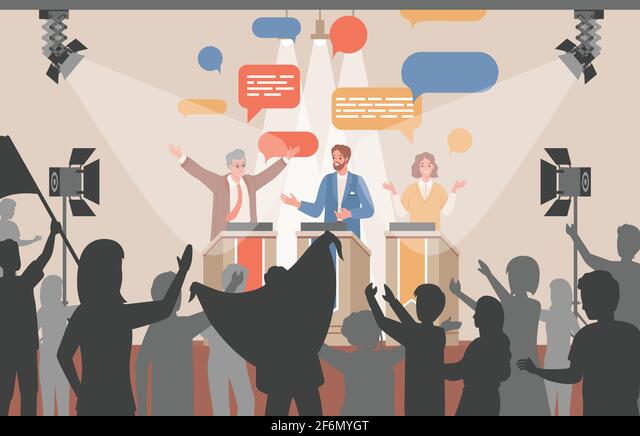
This post highlights the use of public debates in political campaigns. Public debates play a crucial role in fostering voter engagement and shaping the democratic process in election campaigns across the world. Public debates serve as structured discussions platforms for candidates to articulate and present their policies, values, and visions to the electorate, while also allowing voters to evaluate the strengths and weaknesses of competing ideas.
By engaging in public debates, politicians are able to showcase their competence, communicate their positions on various issues, and engage with the public in a transparent and accountable manner. This essay highlights the significance of public debates in political campaigns, emphasizing their role in fostering informed decision-making, promoting civic participation, and ensuring the integrity of the democratic process.
Debates address issues — not persons, ethnicity or religion. They promote political tolerance, constructive dialogue and service to the people.
A political campaign refers to a strategic effort by individuals, groups, or political parties to gain public support and secure elected positions in government. It is a structured and organized series of activities designed to influence and persuade voters to choose a particular candidate or party during an election.
The outcome of a political campaign determines who gets elected to represent the people and for you to get elected, you need to engage with the target voters through political campaign debates. Here are some ways public debates can be utilized in political campaigns and voter engagement:
One of the key advantages of media debates is their ability to promote transparency and accountability in the electoral process. Through the medium of debates, candidates are subjected to scrutiny in real-time, allowing voters to assess their credibility and competence.
Debates force candidates to defend their positions, respond to challenges, manage voters skepticism and articulate their policy proposals in a concise and persuasive manner. As a result, voters gain valuable insights into the candidates’ knowledge, character, and ability to handle critical issues, enabling them to make more informed choices on the Election Day.
Public debates have the power to invigorate voter engagement. By witnessing candidates engage in live exchanges of ideas and arguments, voters become active participants in the political dialogue.
Debates have the potential to generate enthusiasm, spark conversations, and mobilize citizens to become more involved in the electoral process. Again, the excitement and energy surrounding debates can serve as a catalyst for increased voter registration, turnout, and overall civic participation.
In addition to engaging voters, public debates foster a sense of political education and awareness. They provide a platform for candidates to discuss complex policy matters in a comprehensible manner, breaking down intricate issues into digestible arguments that resonate with the public.
Debates also serve as an opportunity for candidates to educate the electorate about their proposed solutions, allowing voters to better understand the potential consequences of their choices. By presenting diverse perspectives on key issues, public debates contribute to a more well-rounded and informed citizenry.
Public debates also have the capacity to shape the broader political discourse. They set the agenda for public discussion and issue-based campaigns by bringing prominent issues that matter to the forefront and compelling candidates to address them.
Debates provide a shared space for contrasting ideas, allowing for a more comprehensive evaluation of different policy approaches. In this way, debates not only influence the electorate but also influence the candidates themselves, as they are pushed to refine their positions and adapt their strategies based on the public’s interests and response.
Public debates are vital for fostering voter engagement and shaping the democratic process. They promote transparency, accountability, and informed decision-making. By engaging voters, fostering political education, shaping the discourse, and holding candidates accountable, debates contribute to a more robust and participatory democracy.
However, while public debates offer numerous benefits, they also face challenges that can hinder their effectiveness. One challenge is the potential for debates to devolve into mere political theater or spectacle. Candidates may be more focused on scoring rhetorical points or engaging in personal attacks rather than substantively addressing the issues at hand. This can diminish the quality of the debate and discourage voters from actively engaging in the process.
Furthermore, the format and structure of debates can sometimes favor certain candidates or limit the depth of discussion. Time constraints, limited opportunities for follow-up questions, and a reliance on soundbites can hinder a more thorough exploration of complex topics. To ensure the effectiveness of public debates, it is crucial to design formats that encourage substantive discussions, allowing for deeper analysis, and promoting fairness among participants.